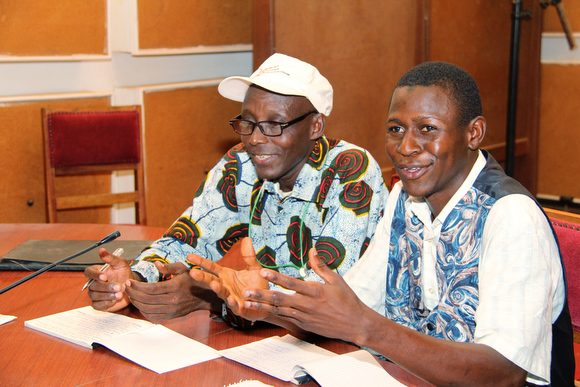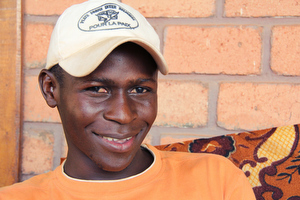
Media CenterA Young Man’s Courage to Fight for Peace in Central African Republic
 Mohamed Bomassa (right) hosts weekly radio broadcasts in the Central African Republic, using techniques he learned at a CRS workshop to promote peace in the violence-torn nation. Photo by Kim Pozniak/CRS
Mohamed Bomassa (right) hosts weekly radio broadcasts in the Central African Republic, using techniques he learned at a CRS workshop to promote peace in the violence-torn nation. Photo by Kim Pozniak/CRS

When you meet Mohamed Bomassa, you’re showered with a big, warm smile that would never give away the hardship and dangers this young man faces on a daily basis. At 24 years old, Mohamed has a maturity and wisdom that are beyond his age. One of only a few Muslims left in Bangui, the capital of the Central African Republic (CAR), he takes great risks to do what is most needed here: speaking out for peace. And he does so in a very public forum.
I accompanied Mohamed to one of the few radio stations in Bangui, Radio Centrafrique. This is where you can find him, and other Muslim men and women, on a regular basis sitting around a big conference table across from the station’s control room, appealing for peace and calling on listeners to work toward reconciliation.
Being this outspoken about peace in a city – and a country – that has suffered the type of violence that is often too cruel to even imagine, Mohamed risks his life every day. But he takes precautions. He’s very careful about leaving his home and moving around the city, and when he does, he wears a hat that hides a small dark spot on his forehead, the result of a lifetime of prayer and a sure give-away of his Muslim identity.
“Disguising my [Muslim] identity hurts me. I was born Central African and can’t believe that my religion excludes me from society,” he says, telling me about his youth when he went to school with people of all faiths. Even now, he’s still close with some of his Christian friends.
 Mohamed Bomassa is a 24-year-old Muslim living in Bangui, the capital of the Central African Republic. He participates in CRS workshops that bring together Muslims and Christians to learn effective techniques to promote peace and reconciliation. Photo by Kim Pozniak/CRS
Mohamed Bomassa is a 24-year-old Muslim living in Bangui, the capital of the Central African Republic. He participates in CRS workshops that bring together Muslims and Christians to learn effective techniques to promote peace and reconciliation. Photo by Kim Pozniak/CRS

His friends, and co-presenters at the radio station, also hide their identities for fear of being killed by the non-Muslim militia, called anti-balaka. Muslim women here have stopped wearing their veils, many are using different, non-Muslim names and have even stopped using the traditional Muslim greeting of “Salem Aleikum” when answering their phone in public. The risks to their lives are real and brutal: just the other day, a young Muslim man in one of Bangui’s neighborhoods was killed and decapitated in public. Attacks like these are a common occurrence here, and are perpetrated by both sides of the conflict. In Mohamed’s neighborhood of Bimbo, 60 percent of Muslims have left the country, most of them to Chad.
People of all faiths have equally suffered in CAR, lost loved ones and had their homes burnt and looted in a conflict that has its origins in political and economic motivations. For years, people of diverse faiths have lived side by side here, attending the same schools, working together, intermarrying and building families. But those inciting the violence have used religion to divide communities, taking advantage of the low economic prospects many young men face here.
Mohamed is one of the people in Bangui – Catholic, Protestant and Muslim – that have so far participated in Catholic Relief Services’ peace trainings: USAID-funded workshops that bring people of all faiths together to give them tools for fostering dialog and reconciliation in their communities. He is also the president of the youth chapter of the Islamic Community of Central Africa, a role that helps him reach other young Muslims to talk about issues affecting their lives.
Before the conflict broke out in CAR, Mohamed owned a small business. The day it was looted, Mohamed says he was lucky not to be there, or he would have been killed. “Sometimes I’m afraid,” he says. “When people attack another Muslim in my neighborhood, I’m afraid the same thing will happen to me.” His family is constantly worried about his safety, especially when he speaks on the radio or even appears on national TV. “But even with the risk,” he says, “I know it’s for a good cause.”
His faith gives him the courage to stay, he says, despite the risks. “I won’t leave the country. I decided to stay when they robbed me and I lost everything. I decided to stay and fight [for peace]."
In the recording room at Radio Centrafrique, Mohamed speaks with a strong voice and the conviction of someone who’s known from an early age that someday he would be a leader in his community. “My goal is to convince all the listeners that it’s not external forces that can resolve this crisis. We need to have dialog and understand that violence is not the solution,” he says.
Mohamed’s message to the international community is that the conflict in CAR is not a religious conflict, and he hopes that with increased efforts of disarmament and improved security, Central Africans will be able to work towards reconciliation and peace.
Mohamed likens the peace process to an illness. “When you take medicine, it doesn’t go away immediately, and can even come back. Peace is fragile and everyone has to do their part to protect it.”
Being out in the community and heard on radio, he’s gotten a lot of positive feedback from people of all faiths. It gives him hope. “Everybody needs to be disarmed in CAR,” he says. “But we also have to disarm people’s minds.”
“CAR is a country that belongs to all Central Africans.”
Note: Despite his difficult situation, Mohamed has been very public about his desire for peace, and gave us permission to use his photograph for this story.

